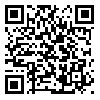Volume 7, Issue 1 (March 2025)
IEEPJ 2025, 7(1): 173-188 |
Back to browse issues page
Download citation:
BibTeX | RIS | EndNote | Medlars | ProCite | Reference Manager | RefWorks
Send citation to:



BibTeX | RIS | EndNote | Medlars | ProCite | Reference Manager | RefWorks
Send citation to:
Alidadi abdolabad M, Nasseri N, Hashemiannejad F. (2025). Determining Dimensions and Components of Ethical Curriculum in Iranian Education System (A Qualitative Study). IEEPJ. 7(1), 173-188. doi:10.22034/7.1.173
URL: http://ieepj.hormozgan.ac.ir/article-1-990-en.html
URL: http://ieepj.hormozgan.ac.ir/article-1-990-en.html
1- Department of Educational Sciences, Ma.C. Islamic Azad University, Mashhad, Iran
2- Department of Educational Sciences, Ma.C. Islamic Azad University, Mashhad, Iran ,naseri5586@mshdiau.ac.ir
3- Department of Educational Sciences, Ma.C. Islamic Azad University, Mashhad, Iran
2- Department of Educational Sciences, Ma.C. Islamic Azad University, Mashhad, Iran ,
3- Department of Educational Sciences, Ma.C. Islamic Azad University, Mashhad, Iran
Abstract: (1549 Views)
Objective: Modern educational systems, in addition to facilitating the transmission of knowledge, serve a pivotal function in the moral and cultural development of learners. In light of the significant role that ethics occupies within the Iranian educational framework and the existing deficiencies in the curricula, the current investigation aims to conceptualize and implement an ethics-centered curriculum in education.
Methods: This research, employing the Delphi methodology alongside the insights of subject matter experts, delineated and assessed the pertinent indicators essential for the advancement of this program.
Results: In the preliminary phase, 52 indicators were derived from the content analysis of antecedent studies, and subsequent to a process of refinement and contextual adaptation informed by expert opinions, 6 additional indicators were incorporated. Ultimately, the 58 certified indicators were systematically categorized into 9 fundamental domains, encompassing objectives, content, pedagogical and learning methodologies, resources and facilities, customs and traditions, temporal considerations, the roles and attributes of educators, the roles and attributes of learners, and assessment. The findings of the research indicate that the formulation of an ethics-based curriculum, while fortifying moral and social values, contributes to the equilibrium of knowledge and education within the educational system.
Conclusions: By proffering a practical framework, this investigation facilitates the design and execution of a coherent initiative aimed at enhancing the moral education of students.
Methods: This research, employing the Delphi methodology alongside the insights of subject matter experts, delineated and assessed the pertinent indicators essential for the advancement of this program.
Results: In the preliminary phase, 52 indicators were derived from the content analysis of antecedent studies, and subsequent to a process of refinement and contextual adaptation informed by expert opinions, 6 additional indicators were incorporated. Ultimately, the 58 certified indicators were systematically categorized into 9 fundamental domains, encompassing objectives, content, pedagogical and learning methodologies, resources and facilities, customs and traditions, temporal considerations, the roles and attributes of educators, the roles and attributes of learners, and assessment. The findings of the research indicate that the formulation of an ethics-based curriculum, while fortifying moral and social values, contributes to the equilibrium of knowledge and education within the educational system.
Conclusions: By proffering a practical framework, this investigation facilitates the design and execution of a coherent initiative aimed at enhancing the moral education of students.
Keywords: Moral curriculum, Iranian education, Delphi method, Moral education, Curriculum, Content analysis
Type of Study: Original |
Subject:
Educational Psychology
Received: 2024/03/20 | Accepted: 2024/07/15 | Published: 2025/03/1
Received: 2024/03/20 | Accepted: 2024/07/15 | Published: 2025/03/1
Send email to the article author
| Rights and permissions | |
 |
This work is licensed under a Creative Commons Attribution-NonCommercial 4.0 International License. |







